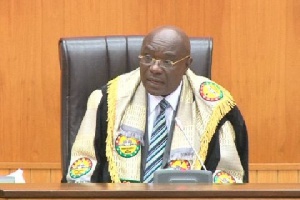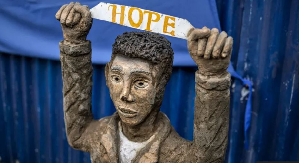Ghana’s Parliament has raised concerns over the country’s preparedness to handle the dreaded Ebola virus should any eventuality hit our borders.
According to the legislative House, security personnel detailed at the various entry and exit points of the country risk contracting the virus, as their findings showed that, the men and women in uniform lacked the requisite logistics to handle any emergency Ebola case.
“At all the sites visited, it was obvious that the level of preparedness and availability of the requisite logistics put the frontline security personnel at serious risk, should any infected person arrive at a border”, Chairman of the Parliamentary Select Committee on Defence and Interior, Fritz Baffour, lamented when addressing the plenary yesterday, over the country’s preparedness to handle the spread of the Ebola Epidemic.
He added: “Health personnel at all the border posts lacked vital items such as – Personal Protective Gear (PPG), Ultra-Violet non-contact Thermometers and disinfectants.
Transportation, such as ambulances, to carry suspected carriers to verification and treatment centers were absent.
In the few places where isolation and holding wards were available, these were ramshackle and rundown, with little or no basic amenities like running water, mosquito nets and beds.
Mr. Baffour and his team, in pursuant to Order 158 of the Standing Orders of the Parliament of Ghana and with the kind permission of the Speaker, had traveled to selected border posts to acquaint themselves with first-hand information, as to whether the posts were well equipped to prevent the disease from infiltrating into the country or not.
Among the border posts visited include Hamile in the Upper West Region, Elubo in the Western Region, Paga, Missiga, Mgnori and Bawku in the Upper East Region, as well as Aflao in the Volta Region.
Since the outbreak of the Ebola epidemic in West Africa, Ghana has been at the forefront to find an antidote to the spread of the virus.
In September, Accra became the headquarters of the UN mission to combat Ebola – where it will co-ordinate international aid to assist West Africa to combat the spread of the virus.
Ghana has so far constructed an isolation center at its industrial hub, Tema, while work on two others in Kumasi and Tamale were yet to be completed.
President John Mahama also recently announced activating an insurance package to motivate health workers who would battle the disease, should any occur in the country. He also announced the procurement of 10,000 pieces of protective wear for the health workers.
But the Parliamentary Select Committee on Defence and Interior said a lot more needed to be done to augment what had already been done.
They recommended that the Ambulance Service should be make available at all the official border posts, at least one ambulance with trained personnel to transport suspected infected disease carriers to the designated facilities.
They also recommended that the frontline personnel must all be supplied with Personal Protective Gear (PPG) and screening equipment, while that of the Isolation and holding facilities for suspected carriers be adequately provided with the necessary amenities to make inmates comfortable and also protect the public from possible contamination and infection.
Additionally, the Committee recommended that communication equipment at all border posts be enhanced so that early warning messages and vital information can be transmitted to key respondents and correspondents promptly.
Furthermore, it said the manning levels at all border posts should be increased with the right equipment and weaponry to effectively patrol the very porous borders.
Despite the concerns raised, the Committee told the plenary that it was really thrilled by the awareness and knowledge level of the personnel they encountered with regard to the Ebola disease and its repercussion.
Contributing to the findings, the Majority Chief Whip, Alhaji Muntaka Mubarak-Mohammed called for a united effort by the leadership of the African continent to address the problem.
He urged the leaders to stop closing their borders and rather develop their health systems to stop the spread of the disease.
The New Patriotic Party (NPP) MP for Nsawam-Adoagyire, Frank Anno-Dompreh on his part appealed for the replication of a research health center like the Noguchi Memorial Health Center to be built in other parts of the country, especially the north.
General News of Friday, 14 November 2014
Source: The Chronicle













